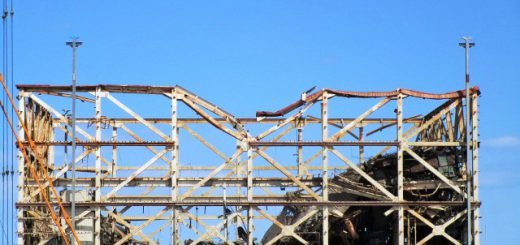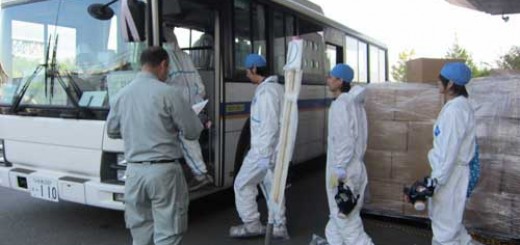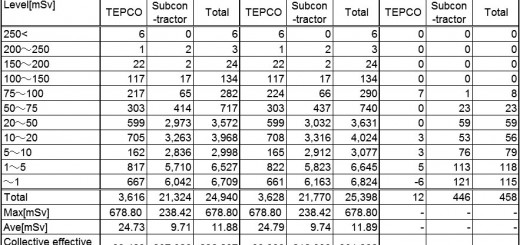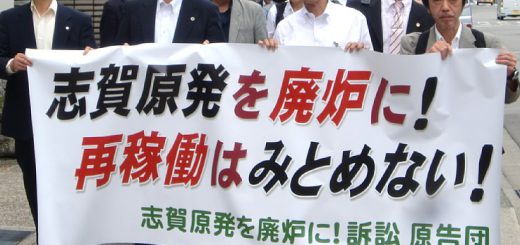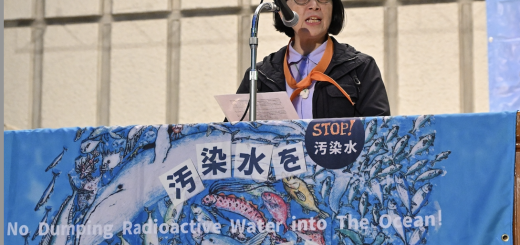Foreign workers in Japanese nuclear power plants?
Report of CNIC Seminar
By Kataoka Ryohei
A seminar titled “Foreign workers and work in radioactive environments” was held in the Japanese Trade Union Confederation (RENGO)’s Headquarters in Tokyo on May 27, 2019. The seminar was hosted by CNIC and the Radiation-exposed Workers’ Solidarity Network. The participants studied TEPCO’s recent announcement that the company would accept “foreign workers with specified skills” at its Fukushima Daiichi Nuclear Power Station (FDNPS). The “specified skilled worker” is the new status of residence that was introduced in Japan in April 2019.
Three people gave lectures in the session. Aoki Miki (Asahi Shimbun reporter) explained about the current situation concerning foreign workers in Japan. Lawyer Ibusuki Shoichi (Co-Director of the Lawyers’ Network for Foreign Technical Interns) talked about the status quo of foreign workers facing various problems in Japan, and Nasubi from the Radiation-exposed Workers’ Solidarity Network reported on the situation of nuclear power plant workers in other countries.
Here, I will summarize the lectures given by Ibusuki and Nasubi.
Amid the rapid aging of Japan’s population and declining birthrates, some sectors, such as construction, agriculture and the nursing-care business, are confronted with a serious labor shortage. To deal with this situation, economic circles and some industries are calling for official permission to employ foreign workers.
The foreign workers who are currently working in Japan, however, are facing not only language and communication problems but also various kinds of problems involving violations of laws, such as excessively long working hours, illegally low and unpaid wages, bullying and power harassment.
Essentially, foreign workers’ human rights should be protected just as those of domestic workers are, regardless of their nationality or status of residence. It is therefore necessary to formulate a system in which Japanese employers are allowed to accept foreign workers on condition that they guarantee workers’ human rights.
Lawyer Ibusuki Shoichi: Current situation of foreign workers in Japan
As of the end of 2018, the number of foreigners living in Japan totaled 2,731,093, up 169,245 from the same period of the previous year. Foreign workers officially registered by Japanese employers totaled 1,460,463 as of the end of October 2018.
Of all foreign nationals working in Japan, Chinese were most numerous, 389,117, followed by Vietnamese, 316,840, and Filipinos, 164,006. Of these, technical interns accounted for 308,489.
The Technical Intern Training Program was introduced in 1993. According to the Ministry of Health, Labor and Welfare (MHLW), the main purpose of the program is to promote transfer of Japan’s technology and skills to developing countries by accepting nonskilled workers from such countries as trainees and helping them acquire job skills.
The reality, however, is that the program is being used by Japanese employers as a cover to exploit cheap labor from abroad.
On the side of the developing countries, various kinds of problems have also emerged concerning this program, such as intermediary exploitation by suspicious brokers who arrange connections between unskilled foreign workers and Japanese employers, requiring payment of high pre-departure commissions, deposits, and penalties for breaches of contract. Another problem is that the overseas organizations supervising this program are collecting management fees ranging from 30,000 yen to 50,000 yen per trainee from Japanese employers (businesses and farmers).
To officially open the doors to a significant number of lower-skilled workers, the government has established two new residence status visas, the Specified Skills No. 1 visa and the higher-level No. 2 visa. The primary purpose of this system is to alleviate severe labor shortages in this country.
Nursing care, construction and twelve other industries were allowed to accept these lower-skilled workers. Workers are classified into two groups, according to the level of their skills and knowledge.
The key requirements to apply for the Specified Skills No. 1 visa is to have relevant skills, knowledge and experience, coupled with conversational-level Japanese language proficiency. This visa allows its holder a maximum stay of five years, but the worker cannot be accompanied by his/her family. If the applicants have three-years’ experience as a foreign technical intern, they are exempt from the tests required for the visa.
The higher-level No. 2 visa holder is allowed to be accompanied by his/her family and is eligible to stay indefinitely through visa renewal. The applicants must have high relevant skills and have to pass a qualifying exam. Most of the 14 industries, however, have yet to prepare their relevant skills tests, and for the time being, only the construction, shipbuilding and ship machinery industries are able to accept foreign workers under the Specified Skills No.2 visa status.
The Japanese government has already signed memoranda of understanding (MOUs) with four countries that are likely to send workers to Japan, namely, the Philippines, Cambodia, Myanmar and Nepal. In addition, the government plans to sign the same agreement with four other nations, Vietnam, China, Indonesia and Thailand.
The status of residence of the visa is of vital importance to foreign workers in Japan. If s/he is deprived of the status, or if s/he is divorced from a Japanese spouse, the worker must return to his/her country.
Technical trainees come to Japan without any knowledge of where they will go or what kind of job they will be required to do. For example, the Vietnamese government forbids its workers to work in the FDNPS or to do decontamination work, but this information was not shared by the Japanese parties concerned. A Vietnamese trainee asked his employer about the meaning of danger pay, and thus came to know that he was engaged in work in a radioactive environment (an environment where a person will be exposed to radiation). This made sensational headlines in mass media.
At present, Vietnam is the only country that forbids its nationals to work in a radioactive environment. Nevertheless, forcing any foreign workers to work in a radioactive environment without their knowledge is totally unacceptable.
Nasubi: Migrant workers and labor in radioactive environments
In the EU, some nuclear power plants are located on international borders, and many workers are engaged in labor in radioactive environments in EU member countries. Workers from outside (subcontract workers) totaled around 30,000 in France in 2003, and 10,000 to 15,000 in Britain in 2010. Some of these workers were non-EU foreign workers.
The EU has a system whereby a worker receives documents issued by a member country’s exposure-dose control office and then submits the documents to the exposure-dose control office of the country where he is going to work next. Each country provides him with an exposure-dose management book to enable him to control his exposure to radiation. But there is no internationally-unified system to control workers’ exposure doses, which poses a concern about health problems caused by accumulated exposure. Thus there is the need to consolidate data on worker exposure from all areas of the EU and conduct unified management of the data. Additionally, it is necessary to unify related regulations of the EU member nations and formulate a system of compensation for health damage caused in other countries.
In Japan, the exposure-dose management book system was established by the industry organization for the purpose of using the book basically in Japan alone. The regulations concerning the safety of labor in radioactive environments are applied solely to the domestic businesses employing or recruiting such workers. If a foreign worker was engaged in labor in radioactive environments in Japan and became sick after returning to his country, it would be possible for him to claim Japanese worker compensation. It is, however, very unlikely that he will be granted the compensation.
In FDNPS, the working environment for Japanese workers is also appalling. Due to the multi-tier subcontractor system, the responsibilities of the electric power company, the prime contractors, and subcontractor employers are ambiguous. Thus, there is a concern that the problems facing the Japanese workers at present may become even more serious and difficult to resolve if the nuclear power plant operator accepts foreign workers with specified skills. One of the possible problems for foreign workers is that the education and training on labor in radioactive environments would be provided by using Japanese language textbooks and they may not be able to fully understand the contents.
On April 18, 2019, TEPCO announced that the utility will accept foreign workers with specified skills at FDNPS. According to the company, the specified skills are construction, production of industrial machinery, electric and electronic information work, automobile repairs, cleaning of buildings, and food service. Referring to decommissioning of the nuclear power plant, it said construction workers would play a central role in the operations and added that the firm would also accept foreign construction workers in the Kashiwazaki-Kariwa Nuclear Power Station.
The Justice Ministry has not allowed the FDNPS operator to accept technical intern trainees at the plant, citing the fact that the trainees are unable to acquire technical knowledge and skills from their work in the plant. On the other hand, the ministry has approved acceptance of foreign workers with specified skills.
Although the workers with the Specified Skills No.1 visa are required to have sufficient Japanese language proficiency to conduct slow-speed daily conversation and have no language problems in daily life, work in nuclear power plants is very complicated and requires a high-level communication ability. Communication difficulties between workers may result in worksite accidents, worker injuries and deaths.
According to TEPCO, the number of foreign nationals registered with FDNPS as radiation-related workers totaled 29 as of February 2019. When an incinerator was built in the plant in May 2018, six foreign-national technical intern trainees took part in the construction work, the utility company said. In March 2018, it was disclosed that a number of technical intern trainees were forced to participate in decontamination work, and four construction-related companies were punished by the Ministry of Justice at that time.
On May 21, immediately before this seminar, the Health, Labor and Welfare Ministry (HLWM) issued a circular (※1) in which it imposed very severe requirements on TEPCO regarding acceptance of foreign workers with specified skills at its nuclear power plants. The notice stipulated three types of requirements, those that should be carried out by the utility, requirements to be implemented by prime contractors, and requirements by the employers of such foreign workers.
In response, TEPCO announced on May 22 that it would not accept foreign workers with specified skills at its nuclear power plants for the time being (※2). Hinting at the possibility of accepting such foreign workers in the future, the utility company added that it would continue its efforts to improve working environments at the plants in cooperation with its affiliated companies. We, however, feel that TEPCO should not accept such foreign workers, not only at present but in the future as well.
※1 “Circular Notice 0521 No.1: Concerning dissemination of the need to ensure industrial safety and health of foreign workers in TEPCO’s FDNPS” (issued by the Industrial Safety and Health Department of the Labor Standards Bureau, HLWM, on May 21,2019)
※2 Report on HLWM’s circular notice concerning dissemination of the need to ensure industrial safety and health of foreign workers in TEPCO’s FDNPS (issued by TEPCO Holdings Inc. on May 22, 2019)

